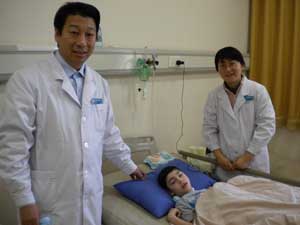Maresu Luis Eduardo-Batten disease(Argentina) Posted on 2 February,2010
Name: Maresu Luis Eduardo 
Sex: Male
Age: 7
Country: Argentina
Diagnosis: Neuronal Ceriod Lipofuscinosis
Beginning Treatment Date: 2009-12-04
Admitted Days: 41
Medical History:
Maresu started having severe epileptic seizures when he was 3 years old which lasted about 30 seconds in duration.
He received treatment at a local hospital; however there were no real improvements. He had epileptic seizures every few months. The seizures became more serious when he was about four and a half years old. He had difficulty with walking and hearing and had a sharp decline in his vision. He also had aphasia and dysphagia. His responses were slow and he gradually had a decrease in cognitive abilities. He required the use of a nasal feeding tube to eat. The muscle strength of all four limbs was decreased, and he was eventually bedridden as a result. Maresu received a muscle biopsy and was diagnosed with Batten disease. The epileptic seizures were not controlled, and he still had partial seizures. There was paroxysmal twitching in all four limbs and the twitching decreased when he was sleeping. He was given sodium valproate and antiepileptic medication for the treatment. He eventually had to be fed a special diet through a gastrostomy tube. Maresu's disease continued to progress in the short term. He was completely dependent on the care of others.
Pre-treatment:
Maresu was in poor spirits. He often slept during the days and sometimes woke up during the night. He had difficulty controlling his bowel movements and had to wear a diaper. His weight had decreased noticeably by 1-2Kg.
Admission PE:
Bp: 108/62mmHg; Hr: 76/min, Height: 124cm, Weight: 14.5kg. Maresu was underweight and his growth was poor. There were no yellow stains or hemorrhagic spots on the skin. The thorax was symmetrical; respiration was weak in the lungs, with no pleural frictional rubbing and no dry or moist rales. Through auscultation it was determined that the heart sounds were strong. The cardiac rate was normal and the rhythms were regular and there was no pathological murmur. His abdomen was ok and there was no swelling in either of the lower limbs.
Nervous System Examination:
Maresu was weak and in a vegetative state. He couldn't cooperate with the memory, calculation, and orientation examinations. He couldn't cooperate with the vision and hearing examinations either. He has aphasia.Both pupils were equally round with a diameter of about 3.5mm. Both eyeballs responded slowly to light stimulus. He has asynergic nystagmus. The forehead wrinkles were symmetrical. Both sides of the nasolabial groove were equal in depth. Maresu had difficulty with swallowing, and had excessive drooling. He was unable to cooperate with the oral examination. He was bedridden and was unable to cooperate with the examination that tests the muscle strength of the limbs. The muscle tone was higher than normal. The tendon reflexes of all four limbs were normal. The abdominal reflex was abnormal. The sucking reflex was negative. Babinski's sign of both lower limbs was positive. Hoffmann's sign of both upper limbs was negative. Maresu couldn't cooperate with the examinations that tests sensitivity and coordinated movements.
Maresu's parents learned about our hospital from other patients who had been treated here, with good results. After consultation with our doctors, they made the decision to come to our hospital for treatment.
Treatment:
Maresu received a complete examination and was diagnosed with neuronal ceroid lipofuscinosis (Type 2). He was given treatment in order to expand the blood vessels, given anti-epileptic seizure medication, given medications to nourish the neurons, and had neural stem cells activated and transplanted. This was combined with physical rehabilitation treatment.
Post-treatment:
Maresu's overall condition has improved. His pupils are more sensitive to light stimulus. His head movements are more flexible. His hearing has had some improvement, and he is more expressive when he feels pain. The voluntary movements in both upper limbs have increased. His shoulder movements have also increased. All of his four limbs have sensitivity to pain and normal reflexes.
Before his discharge, Maresu and his father were reluctant to part with us. They said they love our hospital very much. "You are all like my family members, I love you." Maresu and his father were really impressed with one of our staff members, Lisa. They were both satisfied with the treatment results and said that they hope to be able to come back for the second round of treatment.

